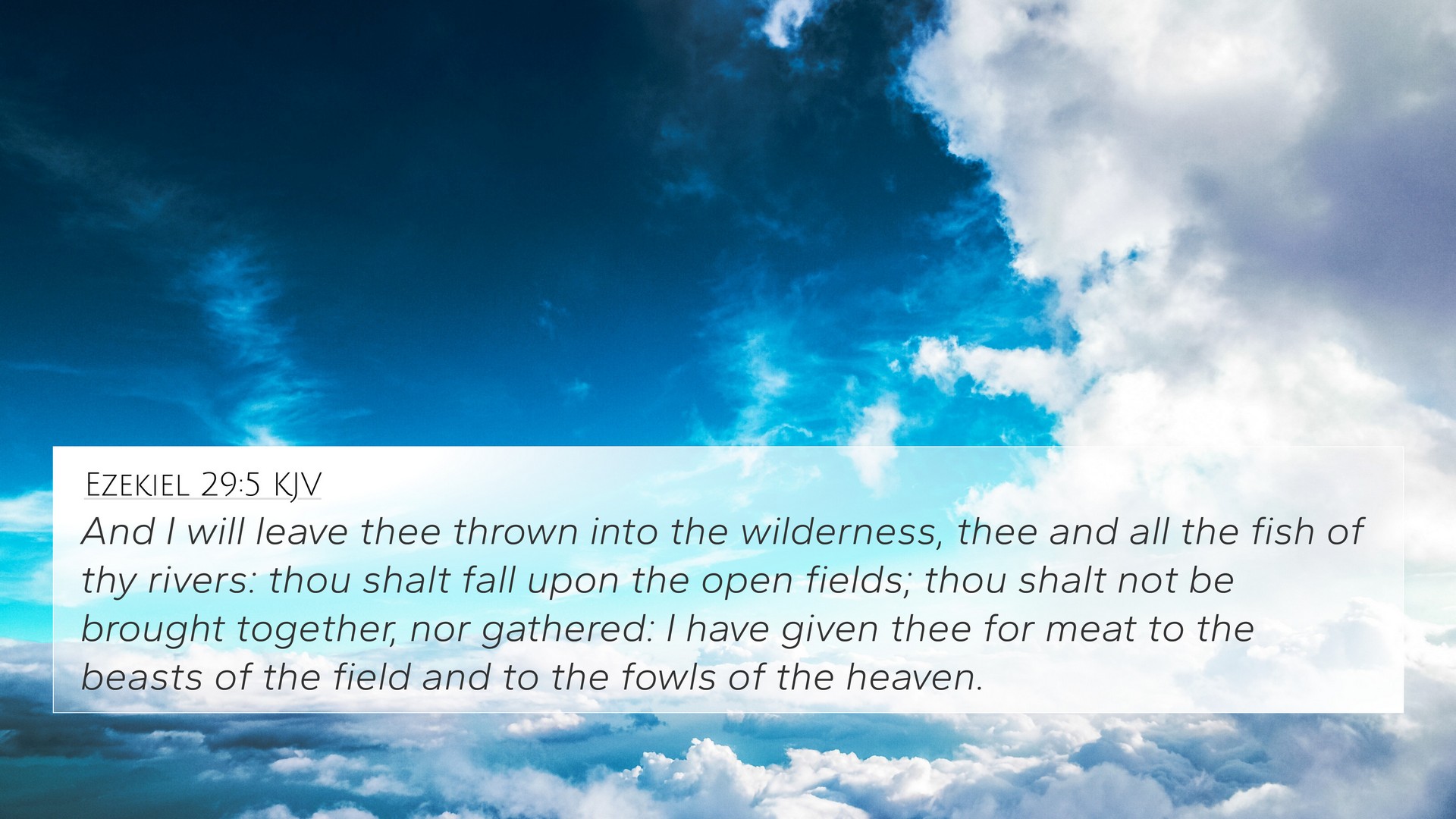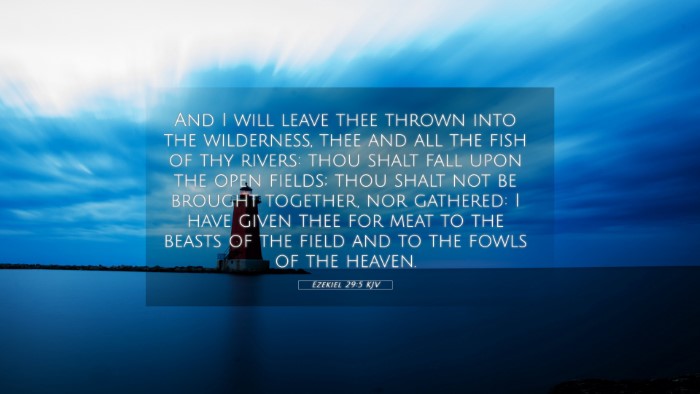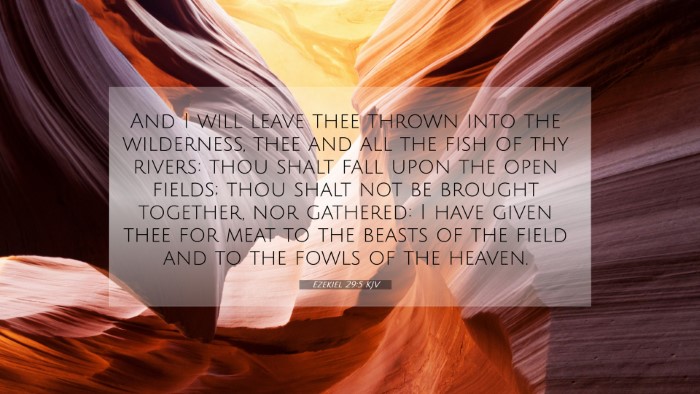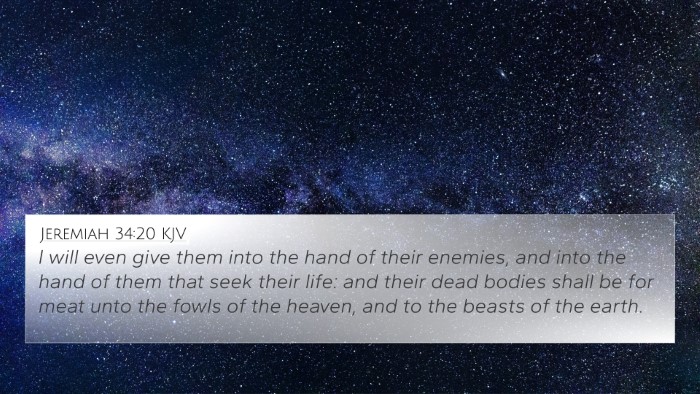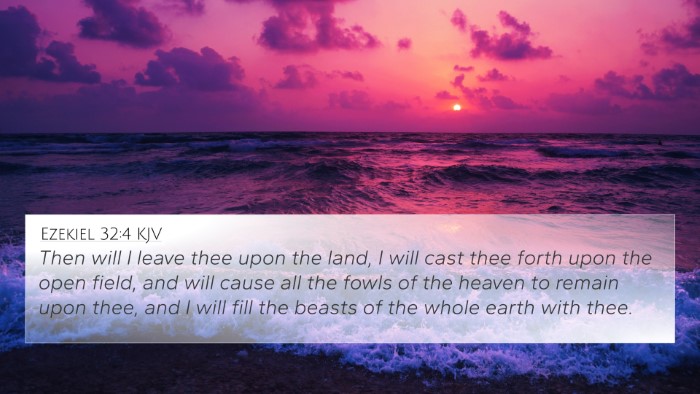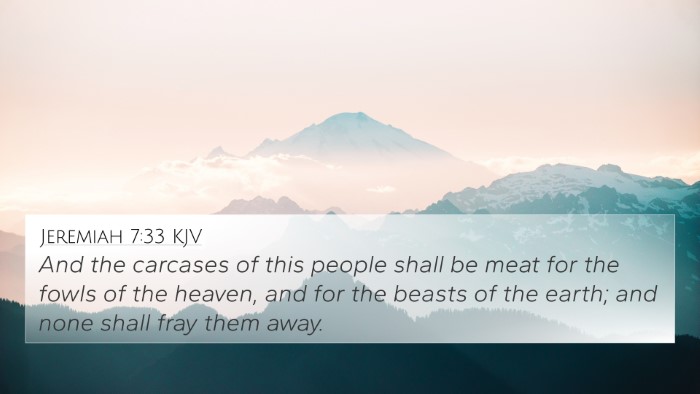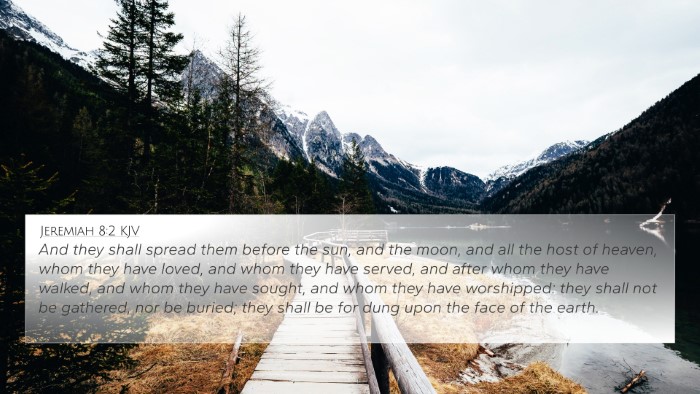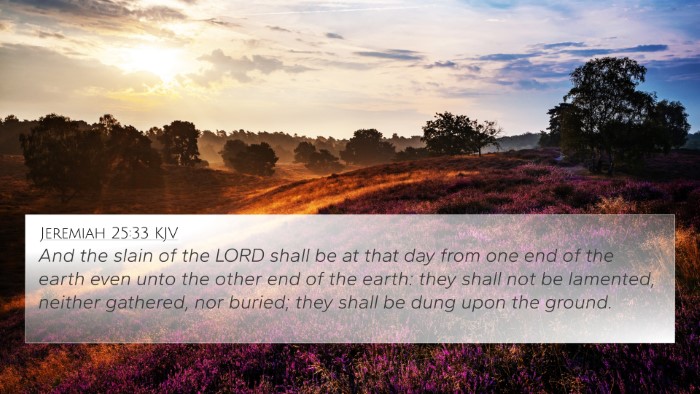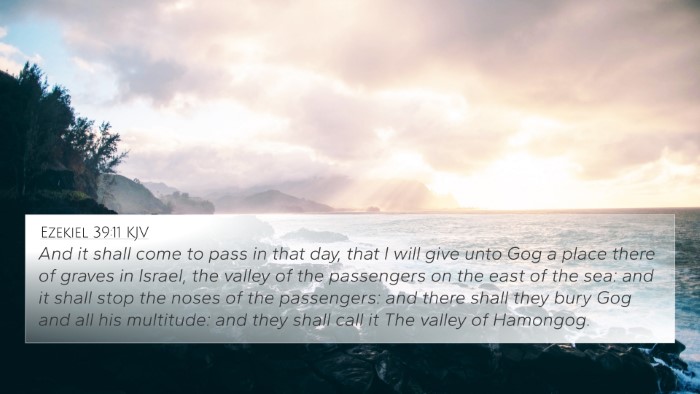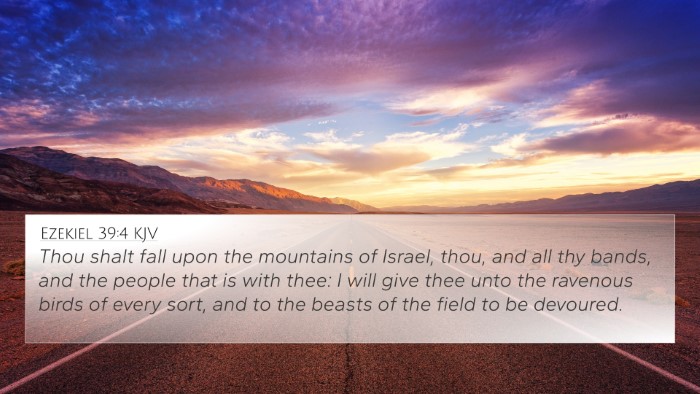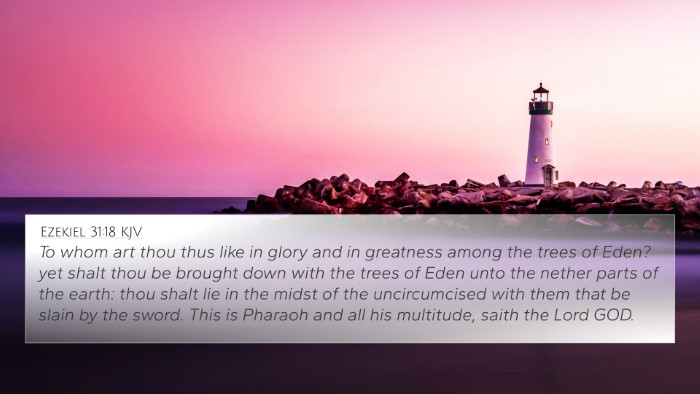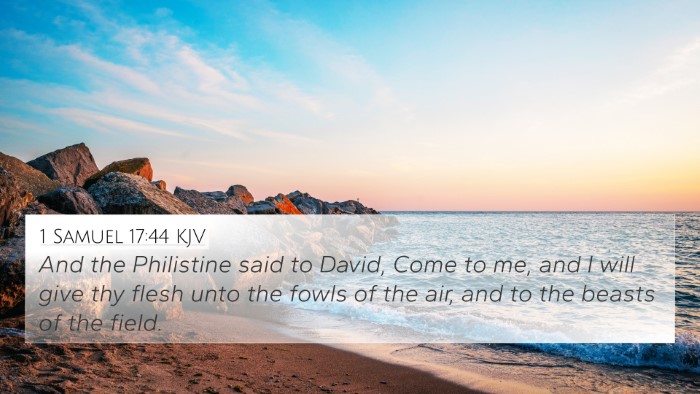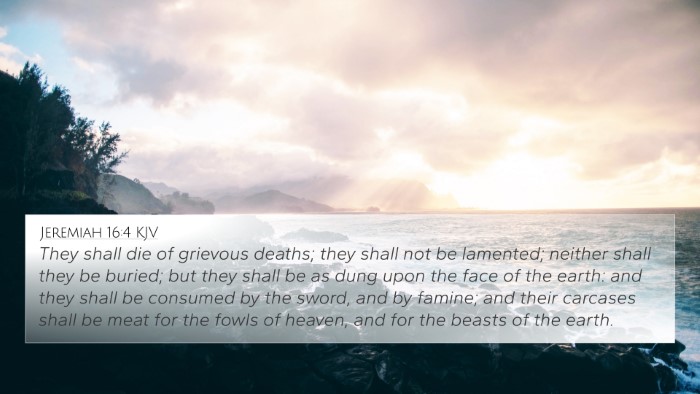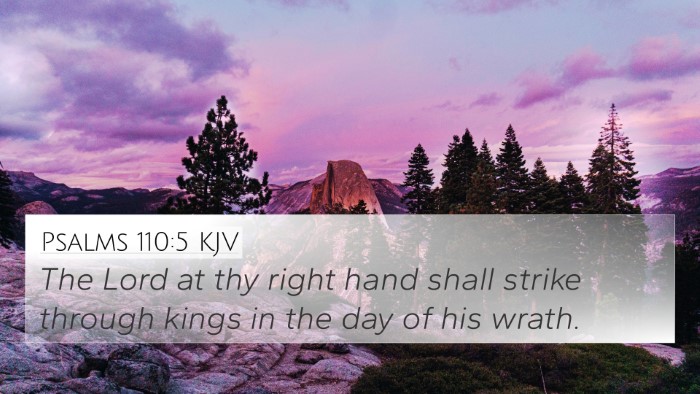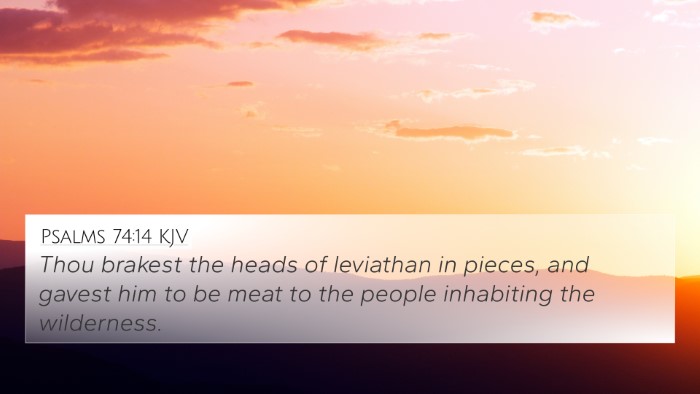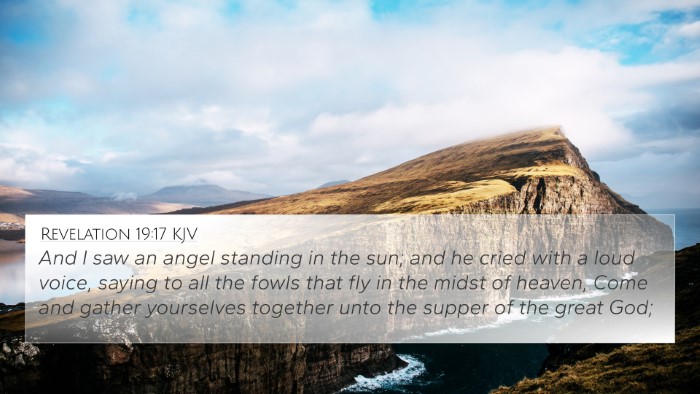Understanding Ezekiel 29:5
Ezekiel 29:5 states: "And I will cast thee out of thy rivers, and I will make the land of Egypt utterly desolate, and the city of Egypt shall be the waste and the desolate, and I will hang up a hook in his nose, and I will bring him forth with a chain, and I will bring him into the wilderness of the people, and I will cause the fowls of the heaven to eat him, and the beasts of the earth shall devour him."
Summary of Meaning
The passage is a prophetic declaration against Egypt, symbolizing God's judgment and consequences of their rebellion and disobedience. Through various interpretations, we can draw profound insights from esteemed biblical commentators.
Matthew Henry's Commentary
Matthew Henry emphasizes the visual imagery of this verse. He interprets the “casting out” as an act of divine judgment where Egypt, symbolized as a great leviathan, is made desolate. He explains that the "hook in the nose" represents a domination and humiliation that would befall Egypt through foreign powers. The vivid imagery conveys God's sovereignty over the nations and His ability to use others as instruments of judgment against those who oppose Him.
Albert Barnes' Notes
Albert Barnes elaborates on this by noting that the “rivers” symbolize the pride and confidence of Egypt in its own strength and resources. By casting them out, God indicates the removal of their security. His observations highlight that the prophecy is a warning, underscoring how the glory of Egypt would be stripped away, turning a once-proud nation into a wasteland. Barnes also parallels Egypt's fate with other nations that forsook God, drawing connections to similar prophetic rebukes in the Scriptures.
Adam Clarke's Commentary
Adam Clarke provides a more explicit interpretation of God's judgment falling upon Egypt due to its idolatry and pride. He discusses the “chain” in the context of captivity and judgment. Clarke emphasizes that this imagery serves as a reminder that rebellion against God leads to inevitable consequences. He further connects this verse to the historical and spiritual fall of nations, providing a broader application for contemporary readers.
Thematic Connections and Cross-References
Ezekiel 29:5 is not an isolated verse but a part of a larger narrative and theological theme in Scripture. Here are some key related verses:
- Isaiah 19:1 - "The burden of Egypt. Behold, the LORD rideth upon a swift cloud, and shall come into Egypt." This verse connects with the prophetic declaration of God's impending judgment upon Egypt.
- Ezekiel 30:4 - "And the sword shall come upon Egypt, and great pain shall be in Ethiopia." This depicts the broader consequences of God’s wrath on nations linked to Egypt.
- Jeremiah 46:13 - "The word that the LORD spake to Jeremiah the prophet against the Gentiles; against Egypt." This mirrors Ezekiel's prophecy, showing inter-Biblical dialogue in God's message to Egypt.
- Revelation 16:13-14 - "And I saw three unclean spirits like frogs come out of the mouth of the dragon, and out of the mouth of the beast..." This relates to the final relevance of evil and judgment.
- 2 Kings 24:7 - "And the king of Egypt came not again any more out of his land: for the king of Babylon had taken from the river of Egypt unto the river Euphrates all that pertained to the king of Egypt." This focuses on political subjugation and loss of power.
- Deuteronomy 28:37 - "And thou shalt become an astonishment, a proverb, and a byword, among all nations whither the LORD shall lead thee." A parallel idea to the desolation foretold in Ezekiel.
- Psalms 137:1 - "By the rivers of Babylon, there we sat down, yea, we wept, when we remembered Zion." This reflects the loss of identity and security, similar to that proclaimed against Egypt.
- Isaiah 43:3 - "For I am the LORD thy God, the Holy One of Israel, thy Saviour: I gave Egypt for thy ransom, Ethiopia and Seba for thee." This speaks to God’s control over nations in relation to His people.
- Ezekiel 26:7 - "For thus saith the Lord GOD; Behold, I will bring upon Tyre Nebuchadnezzar king of Babylon..." This shows God’s hand in orchestrating judgment through earthly leaders.
- Joel 3:19 - "Egypt shall be a desolation, and Edom shall be a desolate wilderness..." This explicitly confirms the theme of desolation associated with God’s judgment on Egypt.
Comparative Bible Verse Analysis
In analyzing Ezekiel 29:5, we notice the cross-references illustrate a cohesive message from God regarding His sovereignty and justice. The thematic connections, such as the loss of pride, judgment, and the ultimate desolation echo throughout various books in the Bible, inviting readers to understand God's character and His dealings with nations.
Connecting Old and New Testaments
When exploring connections between the Old and New Testaments, the themes of judgment presented in Ezekiel are often reflected in New Testament scriptures that deal with divine justice and the fate of the unrepentant. For example:
- Matthew 10:15 - "Verily I say unto you, It shall be more tolerable for the land of Sodom and Gomorrah in the day of judgment, than for that city." This points to the seriousness of rejecting God’s message as warned in Ezekiel.
- Revelation 21:8 - "But the fearful, and unbelieving, and the abominable, and murderers, and whoremongers, and sorcerers, and idolaters, and all liars, shall have their part in the lake which burneth with fire and brimstone." This verse reflects a similar principle of judgment against nations that turn away from God's truth.
Conclusion
In sum, Ezekiel 29:5 serves as a warning of impending judgment for Egypt, reflecting God's sovereignty and the consequences of national pride and idolatry. The insights drawn from the commentaries of Henry, Barnes, and Clarke offer a layered understanding, while the cross-references provide a rich context to appreciate God’s consistent message throughout Scripture.
